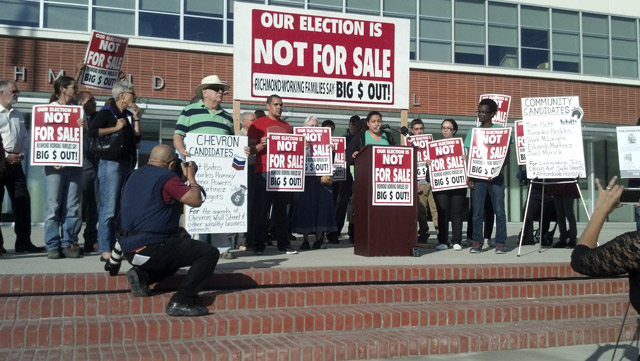
The first Battle of Richmond took place in 1862, when the Confederate army won a stunning victory over Union troops in that Kentucky town. In terms of casualties, 206 Union soldiers were killed, 844 were wounded and 4,303 were captured or missing. The Confederate side suffered far fewer losses – 78 killed, 372 wounded, and only one soldier missing.
The current Battle of Richmond pits Big Oil and Wall Street against the citizens of the working class city of Richmond, California, north of San Francisco. The weapons aren’t rifles and cannons, but corporate cash against the votes of ordinary citizens. What’s at stake is the future of our democracy.
In the wake of the Supreme Court’s Citizens United and McCutcheon rulings, big business is reaching deep into its pockets to stop this challenge to its power and privilege.
Across America, cities have become ground-zero in the battle against plutocracy. In cities like New York City, Seattle, Minneapolis, Pittsburgh, Boston, San Antonio, Phoenix, Newark, Los Angeles and Jackson, Mississippi, voters have recently elected progressive mayors and city council members who campaigned to challenge Wall Street and corporate America.
Once in office, these progressive and populist politicians work with community groups, environmental activists and unions to address the widening gap between the superrich and everyone else, adopt citywide living wage laws to help lift families out of poverty, fight for families facing foreclosures and layoffs, reign in the corporate polluters who put profits over people and public health, end racial profiling by local police and deal with racial inequality and discrimination by landlords and employers.
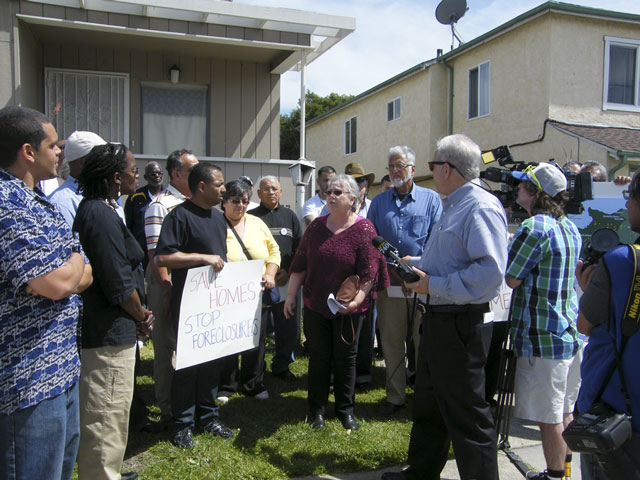 Mayor McLaughlin at the home of a family facing foreclosure. (Photo courtesy of ACCE)
Mayor McLaughlin at the home of a family facing foreclosure. (Photo courtesy of ACCE)
Of course, the plutocrats aren’t sitting on their hands while the people fight for a fair economy. In the wake of the Supreme Court’s Citizens United and McCutcheon rulings, big business is reaching deep into its pockets to stop this challenge to its power and privilege. They are spending billions in campaign contributions, lobbying and election slush funds to try to buy and rent politicians. And, make no doubt about it, many candidates have a “for sale” sign on their campaign headquarters, more than happy to take Wall Street and Big Oil’s money.
Nowhere is this battle between organized people and organized money more evident than in Richmond, a small city of 106,000. There, Mayor Gayle McLaughlin, together with a team of progressive elected officials and their feisty allies among community groups, environment activists and labor unions, have turned their town into a laboratory for democracy around major national issues like Wall Street accountability and climate justice.
Over the past decade, Wall Street banks victimized Richmond’s working class families with high-risk predatory mortgages. As a result, Richmond has had more than its share of foreclosures, particularly among black and Latino residents, who represent 26 percent and 40 percent of the city’s population, respectively.
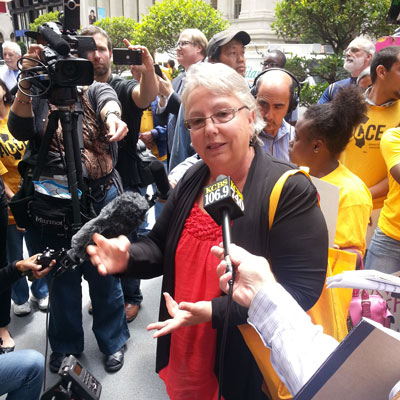 Mayor McLaughlin in front of Wells Fargo Headquarters in San Francisco. (Photo courtesy of ACCE)Close to half of all homeowners there are “underwater” – they are drowning in debt. In response, Mayor McLaughlin and the City Council struck fear into Wall Street by becoming the first city in the country to pass a plan (still to be implemented) to use eminent domain – a tool typically used to hurt our communities – in a new way to fix troubled mortgages and keep people in their homes.
Mayor McLaughlin in front of Wells Fargo Headquarters in San Francisco. (Photo courtesy of ACCE)Close to half of all homeowners there are “underwater” – they are drowning in debt. In response, Mayor McLaughlin and the City Council struck fear into Wall Street by becoming the first city in the country to pass a plan (still to be implemented) to use eminent domain – a tool typically used to hurt our communities – in a new way to fix troubled mortgages and keep people in their homes.
But the real David versus Goliath story concerns Richmond and Big Oil. Mayor McLaughlin and her progressive City Council allies have also stood up to Chevron – America’s third largest corporation (after Walmart and Exxon Mobil) – whose massive Richmond refinery is a major source of greenhouse gas emissions. For years, it spewed pollution and dumped toxic waste into the water and air. Richmond’s rate of child hospitalizations for asthma is double the rest of the state. The Richmond area also has one of the highest rates of breast cancer.
For many years, Chevron controlled Richmond’s municipal government. As late as the 1990s, the city manager’s office reserved a desk for a Chevron executive. But in the past decade, Chevron lost its grip on the city government. Voters were frustrated by high levels of violence, widespread corruption (leading to an FBI investigation), and persistent police harassment and brutality of the city’s Black and Latino residents.
Richmond’s new police chief shifted the department to embrace community-oriented policing. The number of homicides in Richmond declined from 47 in 2007 to 18 in 2012.
In 2004, local activists formed the Richmond Progressive Alliance (RPA), a coalition of environmentalists and Green Party activists, progressive Democrats, Latinos and African Americans. Over the course of several election cycles, progressives began winning seats on the city council and adopting new policies to improve living and working conditions in Richmond. They’ve been bolstered by effective grassroots organizing by the Alliance of Californians for Community Empowerment (ACCE), Communities for a Better Environment (CBE), the Asian Pacific Environmental Network (APEN), the West County Toxics Coalition, the Service Employees International Union (SEIU) and other labor groups.
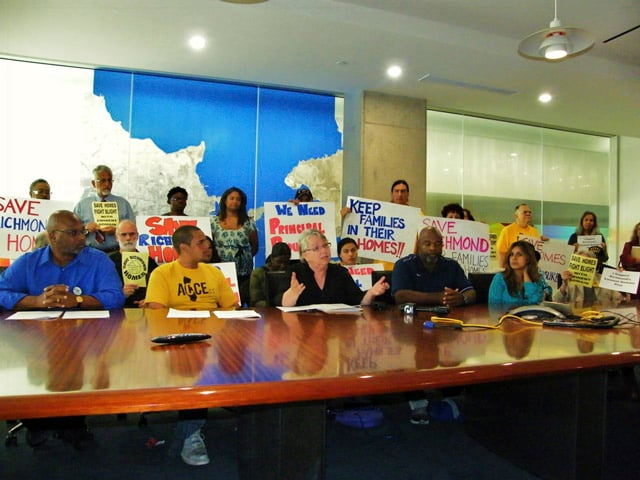 Mayor McLaughlin and Community prior to big vote on eminent domain to save homes. (Photo courtesy of ACCE)
Mayor McLaughlin and Community prior to big vote on eminent domain to save homes. (Photo courtesy of ACCE)
In 2006, McLaughlin ran for and was elected mayor against the incumbent. She was re-elected in 2010. Although the mayor’s office has little formal power, McLaughlin has effectively used her “bully pulpit” to promote progressive causes and campaigns. She’s spoken at a meeting of over 1,000 people to oppose Richmond police’s cooperation with federal ICE raids against undocumented immigrants. She participated in rallies and meetings demanding corporate clean-up of toxins. She led the charge demanding that Wall Street banks help local residents save their homes from predatory lending and foreclosures.
McLaughlin and her progressive council colleagues, as well as community activists and unions, have supported many grassroots and policy initiatives that consolidated their broad political support. They joined forces with “Operation Ceasefire” (a national campaign to reduce gun violence) and “Safe Return” (to help ex-prisoners find housing, job training, and employment in Richmond). The City removed questions about prior convictions from its application forms for municipal jobs. Richmond’s new police chief shifted the department to embrace community-oriented policing. The number of homicides in Richmond declined form 47 in 2007 to 18 in 2012.
The progressives expanded access to playgrounds and athletic facilities for Richmond’s young people, winning support from soccer-loving Latino residents and the predominantly black football teams and their supporters. Richmond created a municipal ID program to help residents (including undocumented immigrants) who lacked driver’s licences and other photo IDs needed to get ATM accounts and other services. Activists got local police to end its driver’s licence checkpoints (which were aimed at catching undocumented immigrants) and focus efforts on stopping drunk drivers. They promote bike lanes, supported worker-owned co-operatives, and expanded public art.
The progressive city officials persuaded Lawrence Berkeley National Laboratory to open its second campus in Richmond, a catalyst for many construction, office and research jobs as well as for attracting private research-oriented firms to locate near the government-run facility. Under the progressives, Richmond’s bond rating was upgraded to A. They’ve also initiated an effort to adopt a citywide minimum wage.
Chevron . . . is used to telling politicians to jump and having them ask, “how high?”
Despite these improvements, Chevron is not happy with Richmond’s municipal government. Why is the oil giant so determined to oust McLaughlin and her colleagues in the November 4 election?
- In 2005, the City Council overturned a local law (enacted in 1992) that allowed Chevron to inspect its own construction projects rather than have city inspectors examine the company’s safety standards.
- In 2008, Richmond voters supported Measure T to require Chevron to pay its fair share of taxes to the city.
- Two years ago, a fire and explosion at Chevron’s oil refinery in Richmond sent 15,000 residents to the hospital. The federal Chemical Safety Board revealed for a decade Chevron had disregarded the advice of its own experts and workers to replace the corroded pipe that failed. Mayor McLaughlin and a coalition of community and environmental groups took Chevron to court. Chevron had to pay $2 million in fines and restitution and pled “no contest” to six charges that included, the Associated Press reported, “failing to correct deficiencies in equipment and failing to require the use of certain equipment to protect employees from potential harm.”
- Mayor McLaughlin and her team also successfully challenged Chevron’s misleading environmental impact study of a proposed expansion project and made Chevron pay a $114 million tax settlement to the city and install ground-level air quality monitors
- Last summer, the city council approved Chevron’s billion-dollar modernization plan for its refinery. But in exchange for that approval, the local officials required the giant oil company to adopt additional air pollution restrictions, stronger safety requirements, and $90 million in “community benefits.”
Chevron isn’t used to being treated this way. It is used to telling politicians to jump and having them ask, “how high?”
McLaughlin is termed out as mayor, but she is running for the city council. With five of seven council seats up for grabs, this election will determine whether Chevron will control Richmond’s future. The oil giant – which last year made $21.4 billion income and paid its CEO John Watson $20.2 million in compensation – has spared no expense to win the second Battle of Richmond.
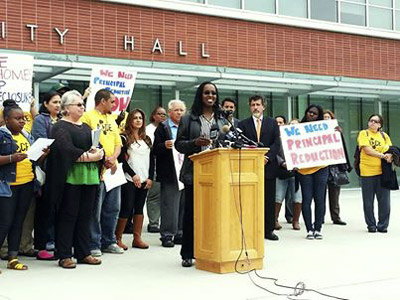 Jovanka Beckles in front of City Hall, July 30, 2014. (Photo courtesy of ACCE)Chevron has already poured about $3 million – over $150 for every “likely” voter – into a committee to support their hand-picked candidates. Those on the progressive slate include: Gayle McLaughlin, Jovanka Beckles, Jael Myrick and Eduardo Martinez for city council, and Tom Butt for mayor. Butt, a longtime council member, has accused the Chevron-backed candidates of making their top priority “to take care of Chevron and developers and the industrial community.”
Jovanka Beckles in front of City Hall, July 30, 2014. (Photo courtesy of ACCE)Chevron has already poured about $3 million – over $150 for every “likely” voter – into a committee to support their hand-picked candidates. Those on the progressive slate include: Gayle McLaughlin, Jovanka Beckles, Jael Myrick and Eduardo Martinez for city council, and Tom Butt for mayor. Butt, a longtime council member, has accused the Chevron-backed candidates of making their top priority “to take care of Chevron and developers and the industrial community.”
There is no local newspaper in Richmond, so Chevron started its own newspaper website called the Richmond Standard, run by an employee of Chevron’s PR firm named Mike Aldax. Its “stories” are nothing more than Chevron propaganda. (To provide more objective news coverage, the Graduate School of Journalism at UC Berkeley started Richmond Confidential, an online news service staffed by graduate students in journalism.
Chevron has also paid for a massive phone call propaganda campaign. Voters in Richmond are getting telephone calls that are thinly disguised as opinion surveys, but are actually attacks on Mayor McLaughlin and other candidates that oppose Chevron’s power grab.
Every day Richmond voters get campaign flyers in the mail paid for by Chevron that viciously attack and lie about McLaughlin and the other progressive candidates. “I have personally received between 20 and 30 mailers from Chevron candidates,” Richmond resident Leon Zhou said at a rally last week.
Chevron’s propaganda accuses Mayor McLaughlin of not doing her job, but in fact, she’s only missed one city council meeting in the past 4 years.
The progressive coalition of community activists, environmentalists and union members has already knocked on thousands of doors to encourage people to vote on November 4. They believe – as progressives always have – that organized people can beat organized money.
Even so, they need money to help sustain their grassroots efforts. They’ve asked supporters to donate to the Richmond Working Families PAC so that they can field enough organizers to knock on every targeted door and get out the vote.
The more voters are aware of Chevron’s efforts to buy this election, the more they support the progressive candidates. Plus, Chevron has made some serious mistakes.
This week the East Bay Express reported that one of the Chevron-backed candidates, Al Martinez, engaged in a variety of criminal deeds while he was a Richmond police officer. Chevron’s political action committee, Moving Forward, has spent $62,000 on behalf of Al Martinez and another $262,000 to attack his chief opponent, Eduardo Martinez, a retired school teacher who is no relation to Al. After the Express reported the charges against Al Martinez, Chevron severed its ties with him.
Chevron has a long history of trying to use its money to peddle political influence. It has spent millions fighting the $9.5 billion in damages it was ordered to pay by the Ecuadorian Supreme Court for pollution of part of the Amazon rainforest.
In national politics, Chevron has made huge contributions this campaign cycle to the National Republican Senatorial and Congressional Committees, US Senate Minority Leader Mitch McConnell and Texas Senator John Cornyn, Senate minority whip as well as an influential member of the Senate Finance Committee.
According to the Center for Responsive Politics’ OpenSecrets.org, Chevron recently donated $1 million to the Congressional Leadership Fund, “a conservative super PAC with ties to Karl Rove’s dark money network.”
Senator Bernie Sanders of Vermont visited Richmond two weeks ago to lend his support to the progressive slate and the feisty progressive activists who are fighting Chevron’s attempt to buy Richmond’s city government.
“At this profound moment in American history, where the billionaire class wants to get it all, we have got to fight back tooth and nail,” Sanders said to an enthusiastic crowd of about 500 at the Memorial Auditorium. “We cannot allow them to take over Richmond. We cannot allow them to take over America.”
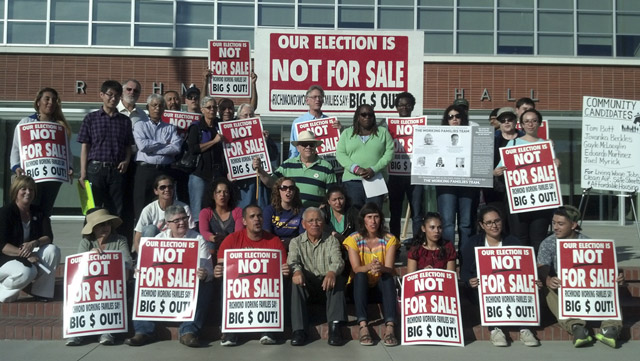 Richmond Working Families press conference at City Hall, October 23, 2014. (Photo: David Solnit)
Richmond Working Families press conference at City Hall, October 23, 2014. (Photo: David Solnit)
At a rally last week, McLaughlin and local residents erected a 10-foot-high sign that said: “Our Election is NOT FOR SALE.” Richmond voters are tired of an avalanche of daily campaign mailers and phone calls, largely paid for by Chevron. “We need to stand up against the corporate money flowing freely into our election,” said Stacey Wilborn, a city employee and member of SEIU local 1021.
Join us in defending the truth before it’s too late
The future of independent journalism is uncertain, and the consequences of losing it are too grave to ignore. To ensure Truthout remains safe, strong, and free, we need to raise $46,000 in the next 7 days. Every dollar raised goes directly toward the costs of producing news you can trust.
Please give what you can — because by supporting us with a tax-deductible donation, you’re not just preserving a source of news, you’re helping to safeguard what’s left of our democracy.